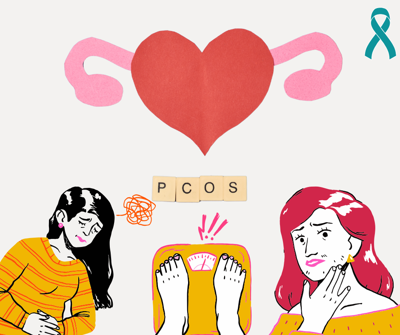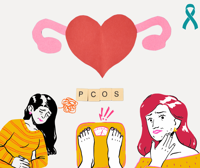
People with PCOS experience irregular periods, pelvic pain, weight gain, hair growth, and more. (Illustration by Rosaura Montes on Canva.)
Women are being underdiagnosed with polycystic ovary syndrome by their doctors because of insufficient research. This calls for providers to be more educated on how to identify the syndrome, commonly known as PCOS, and how to treat it.
PCOS affects 1 in 10 women and is common among Black and Latinas. It causes women to have irregular periods, pelvic pain, weight gain, hair growth and uterine cancer or type 2 diabetes.
According to medical director of women’s health at AltaMed Health Services Dr. Faustina Nevarez, PCOS is a hormonal disorder affecting the ovaries and the pituitary gland. It wreaks havoc on the signals between the ovaries and the pituitary gland.
The pituitary gland is a small, pea-sized endocrine gland located at the base of it brain. It produces essential hormones for the human body, including metabolism, growth, response to stress or trauma, childbirth and more.
“We don't know exactly 100% how it works, but we do know that we're seeing a lot more of it,” Nevarez said.
PCOS has been connected to metabolic syndrome, which has to do with inactivity and processed foods that have made an imbalance in the hormones. This affects the flow between the ovaries and the pituitary gland.
Altamed released a fotonovela earlier this year that discusses PCOS and is used as an educational resource.
How PCOS affects the body
The effects on the ovaries can cause some women not to have a menstruation cycle, which causes a chain reaction. Not having a period means the ovaries aren’t producing eggs which makes it difficult to get pregnant.
“[When you ovulate], you produce progesterone and then you get a period. If you don't produce progesterone properly, you don't get a period, you have these elevated levels of estrogen. Young women who have, typically not 100%, have more fat pads on their body will produce a specific kind of estrogen that keeps the estrogen level such that it doesn't allow the follicle in the ovary to grow,” Navarez said.
The ovaries can also cause hemorrhaging or prolonged bleeding. “I'm not going to call them periods, because I don't think there's an actual ovulation, but when they have such a thick lining in the uterus, it just all falls out at once,” Dr. Navarez said.
Some small cysts can be formed in the ovaries called uterine follicles. They look like a string of pearls, but they’re not cancerous.
In PCOS, an imbalance in hormones affects the body and can create too many androgens, which means there are high levels of testosterone. This causes excess hair on the body and possible hair loss.
It affects the pancreas because of insulin resistance, which can lead to type 2 diabetes. This can lead to kidney failure, retinal detachment, and eye problems when diabetes advances.
Not everyone with PCOS has diabetes or is overweight, they’re just associated with each other.
Dr. Navarez is a firm believer that stress and trauma, which are hereditary in families, play a part in contracting PCOS because they cause high cortisol levels that lead to weight gain.
Even though it may be difficult, women can still get pregnant while having PCOS.
Katy Caro, a Southern California native, is a mother of four boys. She was able to get pregnant with her third and fourth child while being diagnosed with PCOS.
She had two doctors during her pregnancies and both of them treated her PCOS diagnosis differently.
“The first pregnancy with the diagnosis was scary in the sense that the provider told me that women with PCOS are more likely to miscarry,” Caro said. “The second time I wasn’t as scared since my new provider never mentioned a miscarriage or how high [the likelihood]I was to miscarry due to PCOS, but that fear was still in the back of my mind.”
How to reverse and treat PCOS
There are ways to reverse PCOS and its symptoms.
One way to combat it is to manage stress. This ties in with eating healthy and exercising because stress can lead to overeating.
“I don't believe in eliminating foods, because we all like a good milkshake or a pasta dinner. You have to balance it with protein and fiber and reduce salt. To reduce sugar and excessive carbs, that's in your control,” Navarez said.
She suggests eating more natural food and less processed foods, which can also make a difference in the body to combat diabetes and hunger.
“There's a reason why a person who is diabetic is hungry. It's not just that they eat too much. I think that's way too simplistic. Their ovaries, their pituitary gland and their pancreas with insulin get messed up,” Navarez said.
“The salt in these processed foods adds burden to your kidneys and also does bad things to your body, as does the excess sugar,” she continued.
A leading treatment for PCOS is Metformin, a medication that is used for diabetes. Dr. Navarez said it is also being used as a fertility drug that can bring periods back to cause ovulation.
“If you stabilize your blood sugars, then you can reverse some of these [symptoms]. If you get that insulin to come down, you get the ovaries and the pituitary to start functioning together,” Dr. Navarez said.
Navarez suggests that those with PCOS see a gynecologist to diagnose and help manage it.
“If we run to an endocrinologist all the time, I think it'd be very expensive, but endocrinologists help too. And what I'd like to do is have family practitioners and internists who are nurse practitioners who are educated and can identify symptoms,” she said.
Advocating for yourself
There are common signs of PCOS to look out for, including excess body hair, heavy or missed periods, ovarian cysts, weight gain and more.
If anyone has these symptoms, Navarez suggests asking their doctor for a workup to see if there is a PCOS diagnosis.
“You got to advocate for yourself. Hopefully, your friend and your mother are, and your sisters [as well]. I'm a firm believer that you know your body better than anyone. You just have to attach some knowledge to it, and you can get that,” she said.
Finding a doctor that offers solutions is also recommended and you don’t have to keep a doctor you feel isn’t helping you.
“Don’t lose hope. If a provider is shutting you down and wanting to throw birth control at you to mask the symptoms, find another provider that will hear you out and help you find a solution,” Caro said.
“The first provider I had fat-shamed me and basically told me that I have PCOS because I’m overweight without doing an ultrasound. After my blood work came back normal she prescribed birth control and sent me on my way,” Caro said. “The second provider did an ultrasound. After that, I got the diagnosis of PCOS and she gave me solutions to help me conceive naturally before prescribing birth control, and thankfully, her solutions are what helped me conceive.”









(0) comments
Welcome to the discussion.
Log In
Keep it Clean. Please avoid obscene, vulgar, lewd, racist or sexually-oriented language.
PLEASE TURN OFF YOUR CAPS LOCK.
Don't Threaten. Threats of harming another person will not be tolerated.
Be Truthful. Don't knowingly lie about anyone or anything.
Be Nice. No racism, sexism or any sort of -ism that is degrading to another person.
Be Proactive. Use the 'Report' link on each comment to let us know of abusive posts.
Share with Us. We'd love to hear eyewitness accounts, the history behind an article.